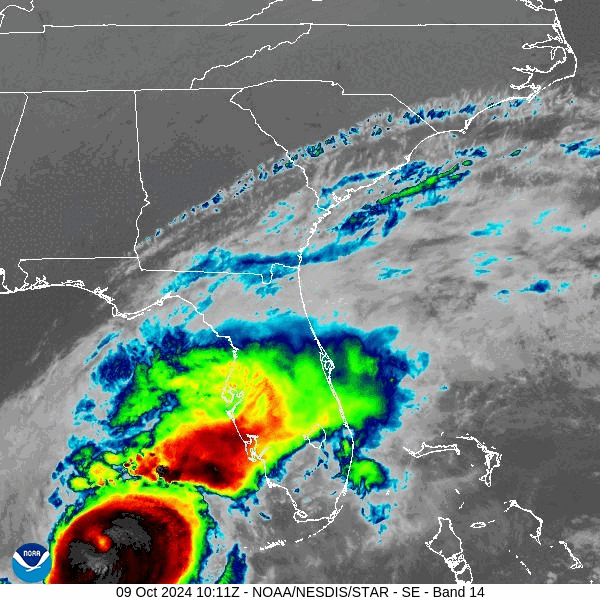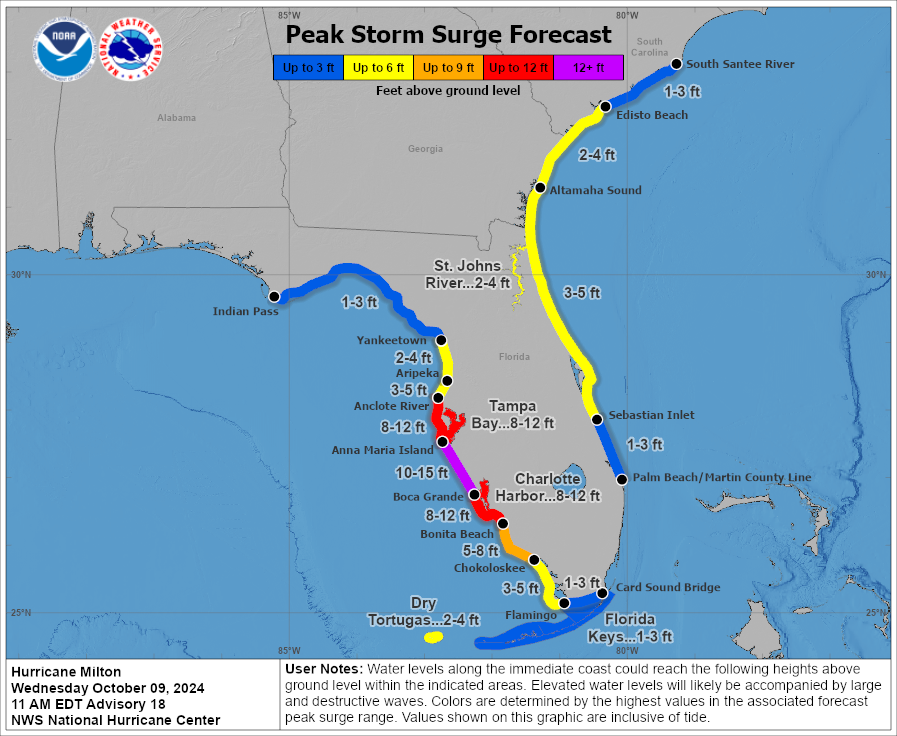Milton weakened slightly Wednesday to a category 4 hurricane and is expected to make landfall on Florida's Gulf coast late Wednesday or early Thursday.
“We must be prepared for a major, major impact to the west coast of Florida,” Florida Gov. Ron DeSantis said.
As of late Wednesday morning, the storm was about 190 miles southwest of Tampa with sustained winds of 145 mph.
“A northeastward motion with some increase in forward speed is expected" through Wednesday night, the hurricane center said.
President Joe Biden, who postponed an overseas trip so he could remain at the White House to monitor Milton, warned that it “could be one of the worst storms in 100 years to hit Florida."
With the storm expected to remain fairly strong as it crosses Florida, hurricane warnings were extended early Tuesday to parts of the state’s east coast.
Get Tri-state area news delivered to your inbox. Sign up for NBC New York's News Headlines newsletter.
More coverage
How bad is damage expected to be?
Florida's Gulf Coast is especially vulnerable to storm surge.
Helene came ashore about 150 miles north of Tampa in the Florida Panhandle and still managed to cause drowning deaths in the Tampa area due to surges that were about 5 to 8 feet above normal tide levels.
With Milton, forecasters warn of a possible 8- to 12-foot storm surge in Tampa Bay.
The county that’s home to Tampa ordered areas adjacent to the bay and all mobile and manufactured homes to be evacuated by Tuesday night. With a predicted storm surge that could swallow a single-story house, Tampa Mayor Jane Castor issued increasingly dire warnings Tuesday to those planning to ride out the storm: “So if you’re in it, basically that’s the coffin that you’re in."
Milton is forecast to cross central Florida and dump as much as 18 inches of rain while heading toward the Atlantic Ocean, according to the hurricane center.
What if I have travel plans to Florida?
Tampa International Airport halted flights Tuesday morning, posting on X that it is not a shelter for people or their cars. And nearby St. Pete-Clearwater International Airport said it is in a mandatory evacuation zone and closed after the last flight left Tuesday. It said all flights were canceled Wednesday and Thursday.
The tourism machine in Orlando, about 84 miles inland from Tampa, started grinding to a halt Tuesday. Orlando International Airport — the nation’s seventh busiest and Florida’s most trafficked — said it would cease operations Wednesday morning. And at least three major theme parks — Walt Disney World, Universal Orlando and SeaWorld — will close, with the latter two also remaining closed on Thursday and Disney likely to follow suit.
Is it difficult to get gas?
The hunt for gasoline has been compounding the stress for some Floridians.
On Tuesday, there were long lines and empty pumps at some Florida gas stations as they struggled to keep up with demand. DeSantis said state officials were working with fuel companies to continue bringing in gasoline ahead before the storm's arrival.
Although DeSantis said there wasn’t a fuel shortage, the hunt for gasoline was another nerve-fraying task for people preparing for a major hurricane. Patrick De Haan, an analyst for GasBuddy, said “replenishments are happening,” but about 17.4% of Florida stations were out of fuel as of Tuesday evening. More than 46% of the stations in the Tampa-St. Petersburg area had no gasoline as of Tuesday evening, according to GasBuddy.
“You’ve got to have patience,” Stephanie Grover-Brock, a Tampa resident in line for gasoline in the nearby Riverview area, said Tuesday.
Ned Bowman, a spokesman for the Florida Petroleum Marketers Association, said the situation was typical for a Florida hurricane — with demand peaking and some stations temporarily running dry. He said suppliers are “constantly” moving fuel to stations.
How was Mexico affected?
As Milton made it's way toward Florida, authorities in the Mexican state of Yucatan reported only minor storm damage. Power lines, light poles and trees were knocked down near the coast, and some small thatched-roof structures were destroyed, according to Yucatan Gov. Joaquín Díaz. He did not report any deaths or injuries.



